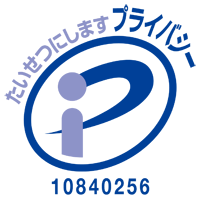Ohsato: I had already been competing in ski orienteering for some time when you started, so I remember feeling very happy to see such a young college student become interested in this sport. What was your first encounter with ski orienteering?
Home > Arc Communications Ski Team > An Interview with Morihiro Horie: An Up-Close Look at the 31-Year-Old Working Athlete
An Interview with Morihiro Horie: An Up-Close Look at the 31-Year-Old Working Athlete
Introduction
Morihiro Horie has been the leading ski orienteer in Japan for 11 consecutive years, but he is also concurrently working full-time for Arc Communications.
Arc Communications president and CEO Mariko Ohsato is also a ski orienteer –with an even longer experience than Mr. Horie– and a committee member of the Japan Orienteering Association.
In this interview hosted by Mrs. Ohsato, we took an up-close look at Morihiro Horie as an athlete and as a businessman.
Table of contents
- It all started with... wanting to visit Italy!
- Life in Sweden, Surrounded by Beauties?
- Training in Japan and Finding the Perfect Work/Sports Balance
- The Importance of Having More Than One Strength
It all started with... wanting to visit Italy!
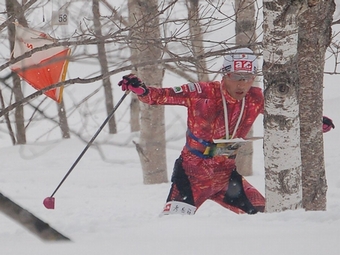
Horie: I belonged to the track club in high school, but then became attracted to outdoor sports that involve running in natural environments rather than on track fields, so I joined the orienteering club at university. That’s how I came to know of this winter sport.
Ohsato: What made you want to give it a try?
Horie: Trying out for the national team in the Junior World Ski Orienteering Championships meant I might get a chance to participate in a competition held in Italy, and possibly travel cheaply to Italy. It isn’t an honorable reason…! (laughs) I didn’t think I could actually make it to the world championships.
Ohsato: Wow, I can’t believe that’s how you got started. (laughs) So this means you almost instantly participated in a foreign competition. How did the race go?
Horie: I grew up in a snowy region and already had some skiing skills, so I thought I’d be able to manage. Of course, it wasn’t that easy. (laughs) My first race in Italy ended in a dismal defeat. But I had a very good time with top skiers from other countries, and that may be the reason why I became captivated by this sport. I wanted to experience this again, and in order to do so I had to grow stronger. This actually still is my driving force.
Ohsato: Could you describe what kind of sport ski orienteering is for those who aren’t familiar with it?
Horie: Ski orienteering is a navigation sport. You wear cross country skis and have to go from one check point to the next as fast as possible.
You could say it’s like treasure hunting in the wilderness. The difference is that luck is a major factor in a treasure hunt, while you have to map your own route in order to reach the goal in ski orienteering. I think that, regardless of speed and level, we all feel the same joy when we finally reach a check point.
The fact that races takes place in the snowy winter wilderness only makes it exciting!
Ohsato: Besides, you can participate in world competitions fairly easily, like the time you went to Italy.
Horie: Exactly. Ski orienteering is a minor sport, so you can aim for the national team if you try hard enough. There are also Masters Championships, so everyone has a chance to participate on the world level. And when you participate in a world competition, you can enjoy talking with top athletes from around the world.
Ohsato: Did anything change for you from your experience at world competitions?
Horie: I could participate in the World Championships again in my 2nd year. There I had such an experience so frustrating I wanted to cry. At the awards ceremony, athletes from various countries were standing on the podium, but not even one Japanese orienteer was able to stand there. The most frustrating thing was that the Japanese team was competing against each other not to end last. I strongly felt that I wanted to stand on the podium, even if it wasn’t 1st place, and prove that Japanese orienteers can achieve such things.
Life in Sweden, Surrounded by Beauties?
Ohsato: What exactly did you do to catch up with the world level?
Horie: I improved and started winning in Japanese competitions during my college years, but there was still a wide gap with the world level. I wanted to compete earnestly and on an even keel with athletes from the world over, get better rankings, so I decided to train abroad in Sweden for 2 years.
Ohsato: Your decision was a huge surprise to us at the Japan Orienteering Association. But we all agreed to support you and your challenge as a pioneer in mastering this sport. How was your time abroad?
Horie: During those 2 years, it was as if every day was training camp. I was surrounded by top athletes who had started practicing ski orienteering at a very young age, and I was a very poor student who had trouble keeping up with my training classes. Even so, I was able to get better by completing everyday training course without giving up, even if it took me more time than anyone else. I think I was able to improve not only my skiing skills but also my orienteering skills. I’m sure this experience has a lot to do with my record of being the best in Japan for 11 consecutive years.
Ohsato: You had to speak Swedish while living there, right?
Horie: Yes. I went to Sweden without being able to speak Swedish at all, so I had a very hard time. I asked for necessary information in English, for instance kind of training we were going to do that day, which ski, suits and equipment to prepare, and when and where to go… But, as a matter of fact, I didn’t really know what to do. Eventually, by listening to others speak and imitating, I became able to have daily conversation with no problem. But at the beginning, I was always so anxious.
Ohsato: We, at the Japan Orienteering Association, were worried that you might be going through a hard time in Sweden. Then one day, you sent us some pictures of your training, and one of them was a photo of you surrounded by beautiful blondes. Then we all became green with envy as we thought, “he’s supposedly ‘training’ in Sweden, but actually he’s just having a nice time with such beauties!” (laughs) How was it in reality?
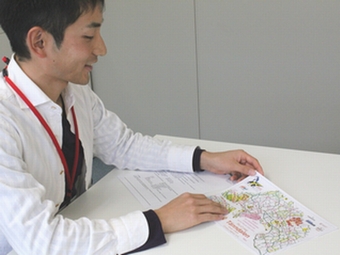
Horie: That’s what people were saying about me? (laughs) Come to think of it, there were a lot of beauties, but at that time I was way too stressed out to notice. (laughs)
Ohsato: Around that time, when I had a chance to speak to Swedish and other North European orienteers, I heard a lot of praise about you. They said, “he came alone from East Asia, and he’s working hard despite his slight frame” or “Even though he’s in the home of ski orienteering and surrounded by strong players, he’s scoring good results.” I was very happy to hear that.
Training in Japan and Finding the Perfect Work/Sports Balance
Ohsato: How was your competitive career after you returned from Sweden to Japan?
Horie: After I came back when I was 24, I still wanted to focus on my raining. So I continued my competitive career while earning money to participate in meets through Internet business.
However, I gradually began to feel unsure and started considering whether I could center my whole life around my competitive career, or if there any business skills that I needed to learn. So I went to my seniors for advice. One of them was you, Ms. Ohsato.
Ohsato: I think top athletes tend to be single-hearted and extreme; they aim to compete in the world with all their might or stop altogether. You had a similar way of thinking too. When you consulted me, I was very supportive of the idea of you becoming a businessman, but then you said “in that case, I will quit ski orienteering.” I thought that was such a shame. I was sure there was a way for you to work without giving up skiing, and I wanted to support that lifestyle somehow, so I strongly encouraged you to join our company.
And we shifted the working hours to the afternoon so you could train in the morning and work in the afternoon. How is your training going by the way?
Horie: It’s going very well. Since I can’t practice on snow, I train on a riverbed using roller skis. To secure time for my training, I chose to live near the riverbed.
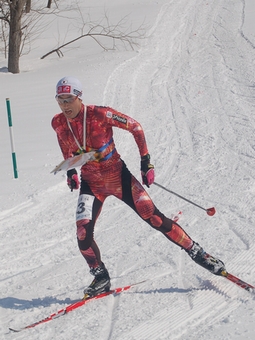
Ohsato: You made the right choice in choosing to live near your training location. That way, you can exercise in the morning and work in the afternoon, but are you able to concentrate on your work? (laughs)
Horie: To tell the truth, I got sleepy in the office at first. Coming to work after hard training is like coming to work after a marathon race: you can fight off the fatigue and end up getting sleepy in the afternoon. Therefore I decided not to train too hard and keep a good balance. That said, I seem to have gained more strength because now I have no problem in the afternoon even after training relatively hard.
The Importance of Having More Than One Strength
Ohsato: Please tell us about your current work.
Horie: I mainly do marketing for the company and manage a new website dedicated to introduce English-taught programs in Japanese universities. My mission consists in increasing traffic to the website so that it leads to business inquiries and orders. Since I was assigned to this job, we have launched three new websites, and the inquiries and profit earned through the Internet have more than doubled.
Ohsato: You have actually been doing a lot more, so I’m sure work alone must be relatively hard. What do you think are the advantages of working while continuing your competitive career?
Horie: I think it leads to a balanced life. In my opinion, it’s important not to place too much weight on work, and to have balance with non-work activities such as sports, hobbies and home life. Also, from a health perspective, moderate exercise is a plus for work and home life. Even if you don’t compete on the world level, I recommend everyone to practice sports.
Ohsato: I agree that balance is extremely important in such a stressful world. I think one should have more than a single strength, more than one trick up one’s sleeve. And that must be why the work-life balance is considered such an important thing.
It’s a strength for a company to be able to include all kinds of people too.
Also, I think it’s wonderful to master something, whatever it may be. In your case it happened to be a sport called ski orienteering, but it can be anything, such as cooking, etc. And I would like to support those activities as a company.
As the stress in our daily lives grows larger, I believe it’s essential to get involved in as many activities as possible and maintain yourself. In that sense, I’m hoping you can become a role model.
Horie: Thank you. I’m grateful for everyone’s support, and I’ll do my best!
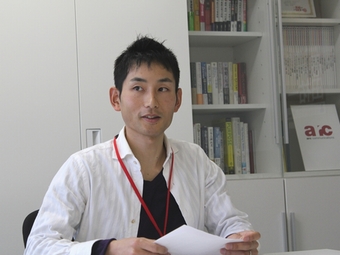
Postscript from the Interviewer
I always feel that the amazing thing about top athletes is that they can continue to do something that seems common for an uncommon length of time.
In my opinion, Morihiro Horie has a very high ability to determine his goal in ski orienteering, establish milestones leading to that goal and reach them, one by one. Taken one by one, it doesn’t look like much so we start thinking that perhaps we can reach the following goal if we try hard enough. However, he has the ability to continue on the long term like no one else.
It’s the same with work. Even if each piece of work is small and unglamorous, the end result can turn out to be quite an achievement. Mr. Horie knows this process from his own experience on the world level, and I’m sure he can use this advantage in his work.
I’m hoping for his further success in ski orienteering and in work.
Arc Communications President Mariko Ohsato
Afterword
Would you be interested in joining the “Arc Communications Ski Team Fan Club” and supporting Morihiro Horie?
We are planning fan events such as send-off parties and others during the off-season where fans can talk personally with him. Let’s support ski orienteering from Japan with Morihiro Horie!
- Fan Club (No annual membership fee)
- Sponsorship Opportunities


